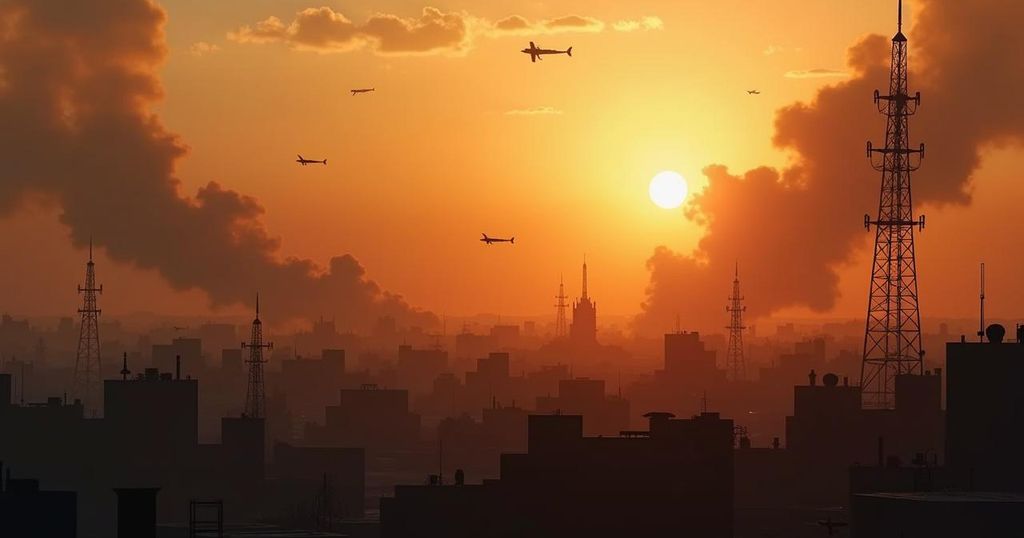Israeli air strikes in Lebanon, Gaza, and Syria have resulted in high civilian casualties, while the Houthis launched a missile at Tel Aviv, which was intercepted. Humanitarian impacts are severe, with tens of thousands displaced. International calls for ceasefire negotiations have emerged, yet responses remain unclear.
Recent Israeli air strikes have tragically resulted in civilian casualties in Lebanon, Gaza, and Syria. These military actions coincided with Yemen’s Houthi movement launching a long-range missile targeting Tel Aviv, which Israeli defense systems successfully intercepted. Eyewitness reports indicate that an Israeli strike on the southern Lebanese town of Shebaa led to the deaths of nine family members, including four children. Additional air raids have devastated areas in southern Lebanon, with significant destruction reported, including a building near a school in Nabatieh and residential homes in Aitit, Tyre district. The humanitarian impact of these operations has been severe; the World Health Organization reported that 37 out of 317 health centers in Lebanon have ceased operations due to ongoing conflicts. Bint Jbeil hospital, located just 4 kilometers from the northern Israeli border, has also shut down due to heavy bombardment, as noted by the hospital’s director speaking to Al Jazeera. Current figures from the UN International Organization for Migration (IOM) indicate over 90,000 individuals have been displaced this week in Lebanon alone. On Friday, the casualties in Lebanon increased dramatically, with Israeli air strikes claiming 92 lives and injuring 153 others, raising the total death toll since Monday to over 700. In Gaza, attacks resulted in the deaths of a family of four — a father, mother, and their disabled children — due to an airstrike on Jabalia refugee camp. Further raids in Jabalia and Deir al-Balah also caused additional fatalities. In Syria, an Israeli airstrike targeted a military site along the Syrian-Lebanese border, killing at least five Syrian soldiers as reported by state news agency Sana. In a parallel escalation, the Houthi movement has fired missiles toward Israel, with a recent missile launch aimed at Tel Aviv resulting in interception by Israeli defense. Previous Houthi attacks have resulted in casualties, including a deadly drone assault on the city in July that killed one person. Additionally, Iranian-linked armed groups in Iraq have expressed intent to escalate their military operations against Israel. In response to the rising tensions, Israeli Prime Minister Benjamin Netanyahu announced a willingness to consider ceasefire proposals, despite having previously not responded to a US-French truce suggestion. The call for a temporary truce has garnered widespread endorsement, including support from the UK, Australia, Canada, and several other nations, as leaders aim to pave the way for extended negotiations towards a permanent ceasefire.
The ongoing conflict between Israel and various militant groups, including Hezbollah and the Houthis, has seen a significant escalation in military actions. The involvement of external actors, such as Iranian-backed groups and the complex humanitarian crises unfolding in Lebanon, Gaza, and Syria, contribute to an intricate geopolitical landscape. This situation has heightened calls for ceasefire negotiations from various international leaders amidst escalating casualties and displacement of civilians.
In summary, the recent surge in Israeli air strikes across Lebanon, Gaza, and Syria has led to substantial civilian casualties and widespread destruction. Concurrently, threats from the Houthis towards Tel Aviv highlight the regional complexities of this conflict. The humanitarian crisis continues to worsen, with numerous health centers shut down and vast numbers of people displaced. International leaders are advocating for a ceasefire, although concrete responses from the involved parties remain uncertain.
Original Source: www.middleeasteye.net







